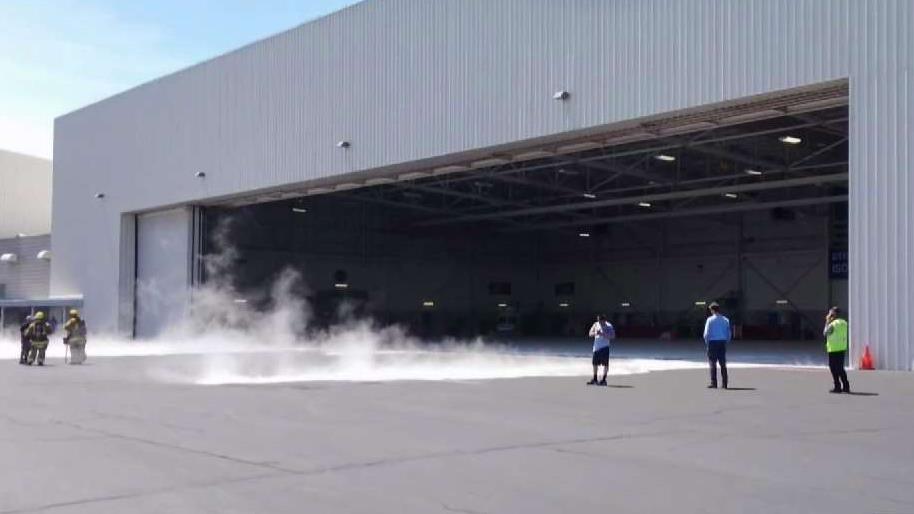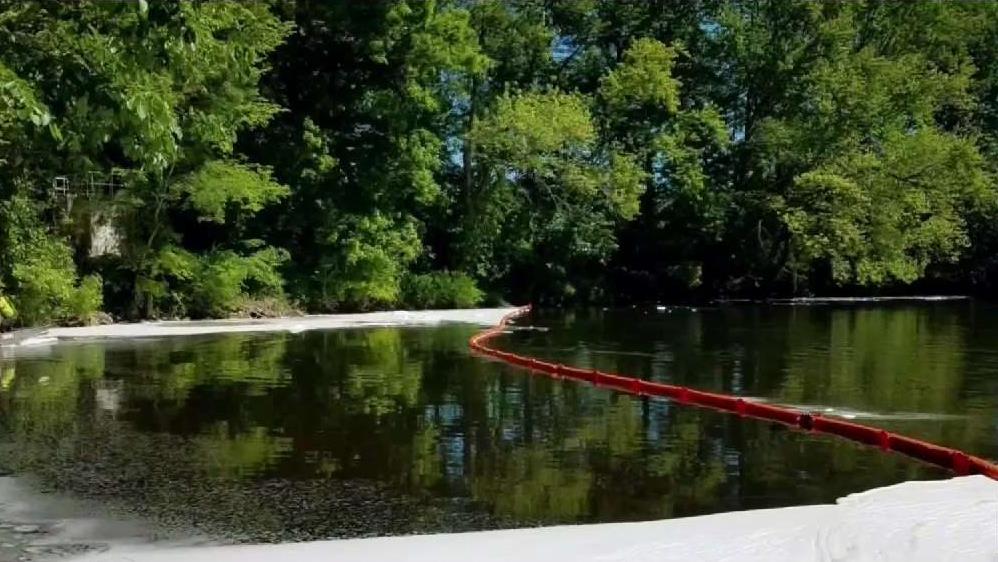A chemical spill into the Farmington River has become the catalyst for one of Connecticut’s most pressing environmental health threats.
On June 8, 50,000 gallons of firefighting foam was accidentally released from the Signature Flight hanger at Bradley International Airport.
The foam went into the hanger’s drains and traveled to the nearby Metropolitan District Water Pollution Control Facility, eventually dumping out into the Farmington River.
The foam contained a chemical called PFAS - short for per-and polyfluoroalkyl substances - and soon after plenty of questions about its potential health effects emerged.
As a precaution, Windsor Mayor Don Trinks said the Connecticut Department of Energy and Environmental Protection put up warning signs downstream of the MDC facility urging people not to eat the fish they catch.
“It really brought home the idea that there’s something really bad that happened,” Trinks said.
According to the Connecticut Department of Public Health and DEEP, PFAS - known as “forever chemicals” - have been linked to health risks ranging from developmental effects in fetuses and infants and certain forms of cancer.
Local
“The spill was like a lightning rod, it caught the attention of the public and it’s a major problem,” explained Rainer Lohmann, a professor of Oceanography at the University of Rhode Island.
Lohmann was tapped by DEEP before the spill to test three Eastern Connecticut rivers for PFAS.
Gov. Ned Lamont put together a task force to address PFAS contamination.
The task force immediately moved to ban the use of AFFF foam and departments across the state are swapping it out for other alternatives.
But Lohmann said PFAS exists well beyond firefighting foam.
Contamination of public and private wells has been identified in Greenwich, Norwalk, East Hampton and Willimantic. The sources range from airports, military bases, firefighting training facilities to former landfills. The first order of business could be to test our drinking water.
“It’ll take Connecticut hundreds of water samples to figure out which areas they might have to focus on,” Lohmann said.
“Whenever Connecticut steps forward and files a lawsuit that’s a big deal, it’s a big undertaking we don’t do it lightly,” said Attorney General William Tong.
Tong said Connecticut is considering following in the footsteps of other states and suing those responsible for producing these chemicals.
“ If you’re going to get damages and you’re going to be successful in a lawsuit you have to have all your facts ready to go and that’s the phase that we’re in now,” Tong said.
States like Minnesota and New York have filed lawsuits against companies that produce products containing PFAS, including 3M, which told NBC Connecticut Investigates that it has invested more than $200 million globally on PFAS remediation and $100 million in testing water sources in the US.
As Windsor waits for PFAS testing results on the Farmington River, Connecticut stands by to learn just how much of it could exist elsewhere.
“We know it’s still moving forward and all of us want it done yesterday,” Trinks said.
Bradley International Airport said it continues to discuss with the State Fire Marshal's office and tenants long term solutions for the airport.
The next step is for the state to decide if it wants to keep the EPA’s current recommended 70 parts per trillion guideline. A number of surrounding states have changed to create tougher restrictions.
.instrux { font-family: Verdana; font-size: 10px; } .container { position: relative; width: 100%; } .image { display: block; width: 100%; height: auto; } .overlay { position: absolute; top: 0; bottom: 0; left: 0; right: 0; height: 100%; width: 100%; opacity: 0; transition: 1s ease; background-color: #008CBA; } .container:hover .overlay { opacity: .8; } .text { color: black; font-size: 15px; position: absolute; top: 50%; left: 50%; transform: translate(-50%, -50%); -ms-transform: translate(-50%, -50%); text-align: center; } h2 { color: black; font-size: 15px; text-align: center; } nav ul li { width: 50%; /* from above */ float: left; list-style: none; margin: 0; padding: 0; }
Click each image for more information

Connecticut Airport Authority Discusses Replacing PFAS Foam

DEEP Suggests Testing Some Wells for PFAS

Tests Show Elevated PFAS Levels in Farmington River Fish

DeLauro Calls for Ban on Food Packages With PFAS

Test Results Show PFAS in Fish Caught in Farmington River

State Monitors Farmington River for Firefighting Foam After B-17 Crash

What’s in the Water? The Dangers of PFAS

Preliminary Test Results Show PFAS Chemicals in Fish From Farmington River

Windsor Issues Health Advisory After B-17 Plane Crash at Bradley

Navy Seeking to Test Private Wells Near Groton Submarine Base

3 More CT Rivers to be Tested for PFAS

CT Airports Look at Ways to Contain PFAS Firefighting Foam

Cancer-Linked Forever Chemicals Found in Consumer Products

Lamont Creates Task Force to Study PFAS Chemical

Photos: Investigation into Firefighting Foam Spill at Bradley Continues



